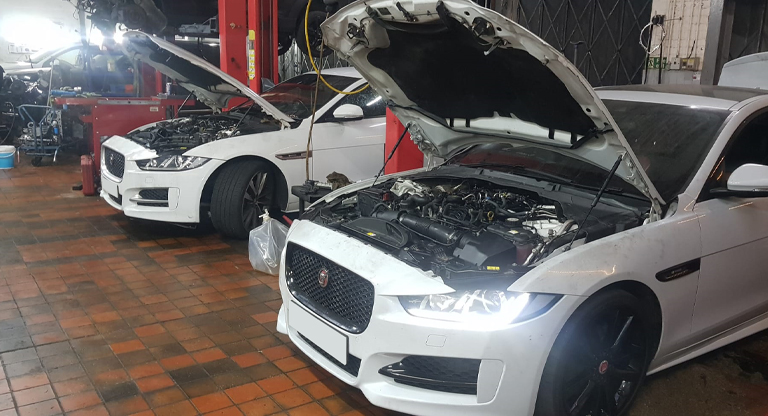- September 12,2023
How to Care for Your Jaguar: Maintenance, Repair, and Service Advice
Jaguars, with their sleek design and unmatched performance, are synonymous with luxury and class. At the heart of this vehicle’s allure is its powerhouse: the Jaguar Engine. This meticulously crafted machine propels the car, giving it that distinctive purr and roar that turns heads and ignites passions. Every Jaguar owner knows the exhilarating sensation of being behind the wheel, feeling the power and precision with which, the car moves. But, as with all marvels of engineering, this fine beast requires the utmost care and attention to maintain its glory.
The thrill of cruising down the highway, the envious glances from pedestrians, and the pride of ownership are just a few of the perks of having a Jaguar in your possession. Yet, this luxury comes with its set of responsibilities. Proper maintenance is paramount to ensure that the vehicle remains in pristine condition, delivers optimal performance, and provides unmatched safety.
This comprehensive guide will not only delve deep into the nuances of maintaining your Jaguar but will also offer insights into its regular and preventative maintenance, common repair challenges, and best places to get it serviced. Equipped with this knowledge, every Jaguar owner can ensure their prized possession runs smoothly for years, embodying the spirit of luxury and power.
Regularly Schedule Oil Changes
For any vehicle, and especially for a car with a Jaguar engine, regular oil changes are fundamental. The oil is the lifeblood of your vehicle, ensuring that everything runs smoothly. For a Jaguar, depending on the specific model and year, it’s generally recommended to change the oil every 5,000 to 7,500 miles. This keeps your engine in top shape and extends its lifespan.
Synthetic oil is typically recommended for Jaguars, given its superior protection against wear, better performance in extreme temperatures, and longer intervals between changes. Always refer to your owner’s manual for specific oil type recommendations.
Pay Attention to the Brakes
The brakes are as important as the Jaguar engine itself when it comes to safety. High-performance cars require high-performance brakes. Listen for any unusual noises, like squeaking or grinding. If you notice any, it’s time for a checkup.
The lifespan of brake pads varies, but as a rule of thumb, it’s good to have them checked at least once a year or every 12,000 miles. Regular inspections ensure safety and prevent costly rotor replacements down the line.
Tyre Maintenance
Your Jaguar’s tyres are the only contact it has with the road, making their condition critical. Regularly inspect them for any signs of wear, cracks, or damage. Ensure they are inflated to the recommended PSI, as indicated in your owner’s manual.
Rotating the tires every 5,000 to 7,500 miles will promote even tire wear, giving you better handling, improved gas mileage, and a longer tire lifespan. Alignment checks are also essential to ensure your Jaguar drives straight and smooth.
Keep It Clean
Yes, a shiny Jaguar is a beautiful Jaguar. But beyond aesthetics, cleaning your car both inside and out can prevent wear and potential damage. Dirt and grit can act as abrasives, wearing down surfaces and potentially leading to rust.
Waxing your Jaguar not only keeps it gleaming but also offers a protective layer against the elements. Clean the interiors too, treating leather seats with care products to ensure they remain pristine.
Monitor Fluid Levels
Your Jaguar engine requires various fluids to function at its best. These include coolant, brake fluid, transmission fluid, and power steering fluid. Periodically check these levels, and top off or replace them as necessary.
When checking the fluids, be on the lookout for any leaks or irregularities. Early detection can save you from hefty repair bills in the future.
Battery Check
A dead battery can leave you stranded. Regularly inspect your battery terminals for any signs of corrosion. If the battery is over three years old, consider having its performance tested to ensure it’s still holding a charge effectively.
Replace Air Filters
Both your engine and cabin air filters need regular replacements. A clogged engine air filter can impact the performance of your Jaguar engine, while a dirty cabin filter affects the air quality inside your car. Generally, it’s advisable to replace these filters every 15,000 to 30,000 miles. However, if you drive in dusty conditions, more frequent replacements might be needed.
Battery Maintenance: The Spark of Life
A dead battery can be quite the dampener. Regularly check your battery’s health, ensuring terminals are clean and corrosion-free. If your Jaguar remains stationary for extended periods, consider using a battery tender to keep it charged and ready to roar.
Genuine Parts: Authenticity Above All
Your Jaguar deserves nothing but the best. Always opt for genuine parts for replacements. While they might be pricier, they guarantee compatibility and performance.
Counterfeit or sub-standard parts can lead to reduced performance, compromise safety, and void warranties.
Scheduled Service: The Routine Checkup
Every car has its service schedule, and Jaguars are no exception. Adhere to the recommended service intervals mentioned in your car’s manual. This includes comprehensive checks, fluid replacements, and other necessary tweaks. Regular service not only extends your car’s lifespan but also ensures peak performance, making every drive an event to remember.
Your Jaguar is more than a mere mode of transport. It’s a sign of luxury, power, and elegance. By following these maintenance, repair, and service tips, you’re not just looking after a vehicle – you’re preserving a legacy. Happy driving!

